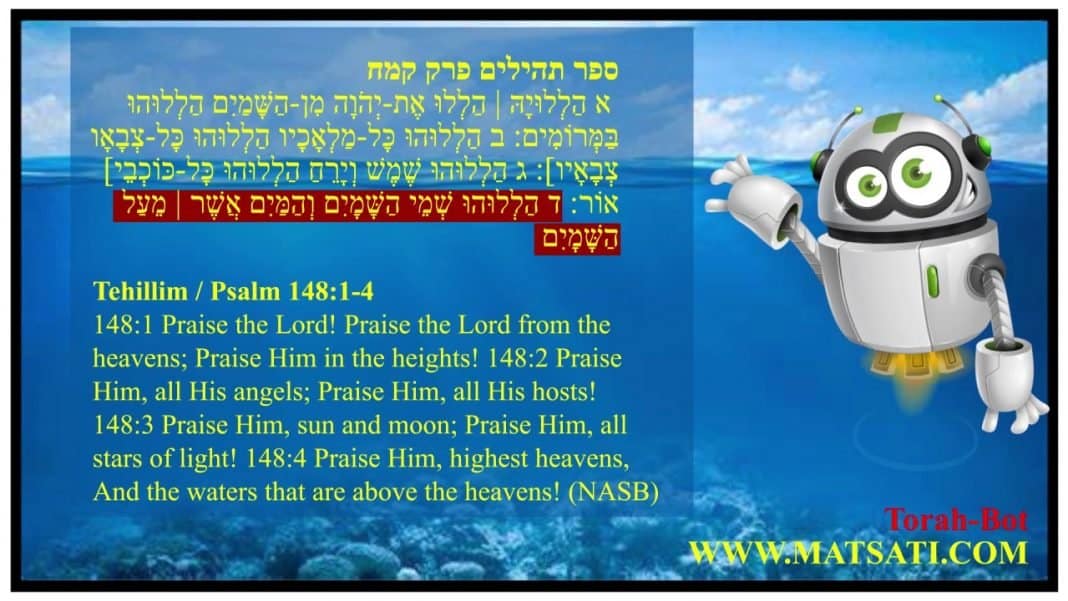ספר בראשית פרק א
ו וַיֹּאמֶר אֱלֹהִים יְהִי רָקִיעַ בְּתוֹךְ הַמָּיִם וִיהִי מַבְדִּיל בֵּין מַיִם לָמָיִם: ז וַיַּעַשֹ אֱלֹהִים אֶת-הָרָקִיעַ וַיַּבְדֵּל בֵּין הַמַּיִם אֲשֶׁר מִתַּחַת לָרָקִיעַ וּבֵין הַמַּיִם אֲשֶׁר מֵעַל לָרָקִיעַ וַיְהִי-כֵן: ח וַיִּקְרָא אֱלֹהִים לָרָקִיעַ שָׁמָיִם וַיְהִי-עֶרֶב וַיְהִי-בֹקֶר יוֹם שֵׁנִי:
Bereshit / Genesis 1:6-8
1:6 Then God said, ‘Let there be an expanse in the midst of the waters, and let it separate the waters from the waters.’ 1:7 God made the expanse, and separated the waters which were below the expanse from the waters which were above the expanse; and it was so. 1:8 God called the expanse heaven. And there was evening and there was morning, a second day. (NASB)
ספר תהילים פרק קמח
א הַלְלוּיָהּ | הַלְלוּ אֶת-יְהֹוָה מִן-הַשָּׁמַיִם הַלְלוּהוּ בַּמְּרוֹמִים: ב הַלְלוּהוּ כָּל-מַלְאָכָיו הַלְלוּהוּ כָּל-צְבָאָו [צְבָאָיו]: ג הַלְלוּהוּ שֶׁמֶשׁ וְיָרֵחַ הַלְלוּהוּ כָּל-כּוֹכְבֵי אוֹר: ד הַלְלוּהוּ שְׁמֵי הַשָּׁמָיִם וְהַמַּיִם אֲשֶׁר | מֵעַל הַשָּׁמָיִם:
Tehillim / Psalm 148:1-4
148:1 Praise the Lord! Praise the Lord from the heavens; Praise Him in the heights! 148:2 Praise Him, all His angels; Praise Him, all His hosts! 148:3 Praise Him, sun and moon; Praise Him, all stars of light! 148:4 Praise Him, highest heavens, And the waters that are above the heavens! (NASB)
An interesting passage we read in the Bible is from Tehillim / Psalms 148:4 which mentions the waters that are above the heavens. This appears to be a reference to what we read in Bereshit / Genesis 1:6-8 (ו וַיֹּאמֶר אֱלֹהִים יְהִי רָקִיעַ בְּתוֹךְ הַמָּיִם וִיהִי מַבְדִּיל בֵּין מַיִם לָמָיִם: ז וַיַּעַשֹ אֱלֹהִים אֶת-הָרָקִיעַ וַיַּבְדֵּל בֵּין הַמַּיִם אֲשֶׁר מִתַּחַת לָרָקִיעַ וּבֵין הַמַּיִם אֲשֶׁר מֵעַל לָרָקִיעַ וַיְהִי-כֵן: ח וַיִּקְרָא אֱלֹהִים לָרָקִיעַ שָׁמָיִם וַיְהִי-עֶרֶב וַיְהִי-בֹקֶר יוֹם שֵׁנִי:) Here the text states that “and God said there was a firmament in the midst of the waters, separating waters from waters” (וַיֹּאמֶר אֱלֹהִים יְהִי רָקִיעַ בְּתוֹךְ הַמָּיִם) and there was the firmament between the waters. (וִיהִי מַבְדִּיל בֵּין מַיִם לָמָיִם) the scriptures goes on saying, “and God made the firmament and caused a division between the waters below from the firmament (וַיַּעַשֹ אֱלֹהִים אֶת-הָרָקִיעַ וַיַּבְדֵּל בֵּין הַמַּיִם אֲשֶׁר מִתַּחַת לָרָקִיעַ) and between the waters above the firmament” (וּבֵין הַמַּיִם אֲשֶׁר מֵעַל לָרָקִיעַ) “and it was so” (וַיְהִי-כֵן). The text is pretty clear in 1:8 saying, “and God called the firmament the sky/heaven and there was morning and there was evening the second day (וַיִּקְרָא אֱלֹהִים לָרָקִיעַ שָׁמָיִם וַיְהִי-עֶרֶב וַיְהִי-בֹקֶר יוֹם שֵׁנִי). In Bereshit / Genesis 1:8 it makes very clear, the firmament is called the sky. The controversial passage from Tehillim / Psalms 148:4 and Bereshit / Genesis 1:7 is concerning the phrase “waters above the expanse/firmament/sky/heaven.” According to the Torah, this text is meant to be taken (interpreted) literally. The English translation presents a problem in our understanding of the waters above the firmament, atheists have used this as a proof text of a sort to argue the creation account is only metaphorical and not to be taken as literal. Let’s look at these verses a little closer beginning with Tehillim / Psalms 148:4.
Looking at the Hebrew text is always a good way to start. Tehillim / Psalms 148:4 states, הַֽ֭לְלוּהוּ שְׁמֵ֣י הַשָּׁמָ֑יִם וְ֝הַמַּ֗יִם אֲשֶׁ֤ר ׀ מֵעַ֬ל הַשָּׁמָֽיִם׃ the first word הַֽ֭לְלוּהוּ is from the root הלל meaning praise, the second two words have the same root (שְׁמֵ֣י הַשָּׁמָ֑יִם) for heaven, the first word is in the construct form which translates as heaven of heavens, the last phrase, וְ֝הַמַּ֗יִם אֲשֶׁ֤ר ׀ מֵעַ֬ל הַשָּׁמָֽיִם means “and the waters” (וְ֝הַמַּ֗יִם) that (אֲשֶׁ֤ר) from upon/above (מֵעַ֬ל) the heavens (הַשָּׁמָֽיִם). Now some Bible translations take מֵעַ֬ל to say “above” in reference to Bereshit / Genesis 1:7. The word על reminds me of the phrase על יד meaning literally (upon the hand) which is translated as “next to” so I feel a better rendition of this is the water that is upon/in/next to the heavens. We know according to the creation account the heavens (שָׁמָיִם) describes the atmosphere or the sky above the earth, and/or outer space. This reference here in Tehillim / Psalms 148:4 may simply be a reference to the heaven above the earth, the atmosphere, and the waters as being the moisture that is in the air here on earth. This makes sense and is consistent with what we read in the Torah, according to Vayikra / Leviticus 26:3 which states “If your walk in My statutes, and keep My commandments, and do them” God promises to show great favor to His people vowing rain in its season, bountiful produce, peace and prosperity, safety and fertility. Notice how rain is considered a blessing from God, and that God would bring the Rains in their season if his people listened and obeyed. So praises could be attributed to the waters just as the psalm is describing. With this reading of the verse, there is no controversy. A similar interpretation “and between the waters above the firmament” (וּבֵין הַמַּיִם אֲשֶׁר מֵעַל לָרָקִיעַ) as this has a similar situation, the word מֵעַל may be leading us to understand that the waters are simply the moisture in the sky which is scientifically consistent!
The point is, an argument from the original languages totally diffuses the atheist trying to use this verse to claim the creation account is metaphorical and not literal. A closer look at the Scriptures however demonstrates something consistent with modern science!





